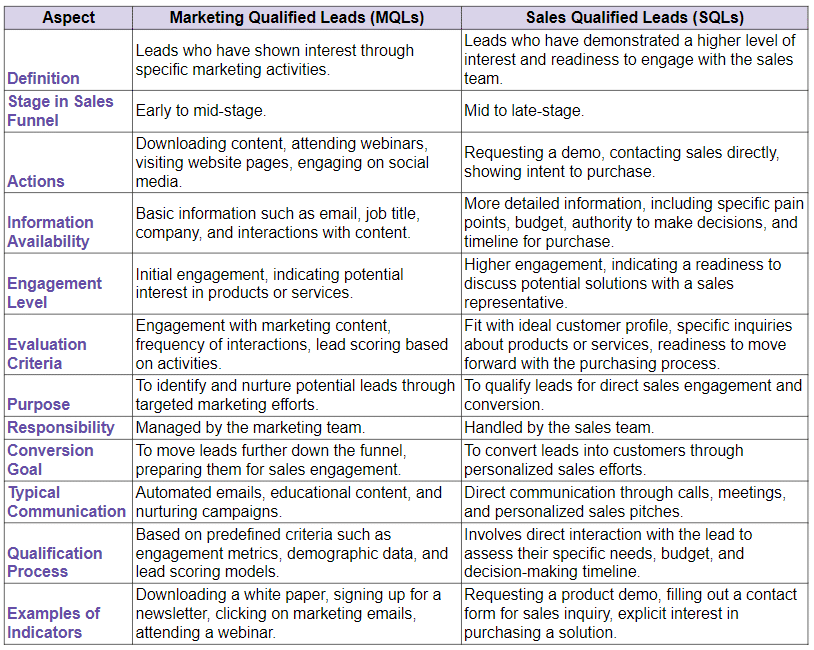The ultimate goal of sales and marketing is to get customers. However, this is a task easier said than done.
Lead conversion is needed to move your prospects through the funnel to become customers and is an important step that needs to be maintained to keep up revenue and close on more deals.
At the core of lead conversion comes in the identification of MQLs and SQLs.
But how can one convert leads if they don’t even understand the difference between MQLs and SQLs?
These two different terms refer to customers in different stages of their journey through your funnel.
When you don’t know the difference between MQL vs SQL prospects, you can find yourself struggling for consistency between your sales and marketing teams and losing prospects when they aren’t effectively worked on.
In this article, we’ll help you understand what MQL vs SQL means and give you some tips on how you can transfer between the two and create a cohesive, clear funnel process. This helps your brand convert leads and increase revenue.
What is an MQL?
A marketing qualified lead (MQL) is a lead who has engaged with your brand, products, solutions, or services in a way that indicates potential interest. This can include actions such as downloading a white paper, attending a webinar, or repeatedly visiting key pages on your website.
This is an important stage of lead qualification, where the lead has shown enough interest to be considered for further marketing efforts.
At this stage, while you may have some basic information about their interactions, you might not yet have detailed insights into their pain points or detailed demographics.
The criteria used to identify an MQL can vary but typically include both surface-level interactions, like social media engagements or page visits, and more substantial actions, such as filling out a contact form or requesting a demo.
Why Do MQLs Matter?
It’s important to mark your leads as MQLs when they take an action that indicates they have interest in what you do.
This helps you categorize them apart from others in your database who haven’t taken that step yet and haven’t indicated that they might want to purchase from you.
When you don’t highlight in your system when a customer takes an action that indicates they have interest, you can lose out on opportunities for additional marketing to move them through your funnel closer to a sale.
These MQLs are the people you need to be working with, rather than cold leads or those who haven’t interacted or engaged with your brand at all.
What is an SQL?
An SQL is a sales qualified lead, which is the next stage of lead identification.
This lead is a prospective customer who has indicated that they would like to engage with your sales team.
This can be taken directly, by filling out a contact form or sending an inquiry to a salesperson, or indirectly, by taking a certain number of specific actions that indicate a strong interest in purchasing.
SQLs are the next evolution of an MQL, and are usually vetted by your marketing team before they are handed off to sales.
The prospect no longer has a passing interest in your brand with a few interactions and engagements, but instead is a prime candidate for a sales opportunity.
Therefore, SQLs need to be the priority as they are the leads who are closest to making a purchase decision.
Why Do SQLs Matter?
Some brands and sales teams fail to identify which of their leads are SQLs.
That can lead to issues, especially when it comes to where the time of salespeople should be spent.
Without an SQL identification, sales team members might be putting effort into converting leads that aren’t that interested in purchasing from the brand, and ignore those who are just one step away from buying.
SQL vs MQL: The Difference Explained
To put it simply, MQLs are leads who have given a soft indication that they are interested in your products, while an SQL has given a hard indication that they want to purchase from your brand.
The MQL is the beginning stage, while the SQL is what that same MQL will evolve into with the help of sales and marketing tactics.
MQLs are interested in your brand, but aren’t ready to make a purchase decision just yet. SQLs, on the other hand, are ready to talk to a salesperson and work towards a purchase from your company.
You don’t want to push on a MQL before they are ready to buy, and you don’t want to leave an SQL sitting without input from a salesperson. They need to work together.

How They Work Together
When you can successfully identify SQLs and MQLs, your sales team can focus on better qualified contacts and let marketing teams work on moving MQLs through the funnel until they can be identified as an SQL.
This helps marketing and sales teams work together, rather than stepping over each other’s toes.
Each team will know what leads they should work with and when they can pass the lead on to the other.
How to Transition a Lead from MQL to SQL
Now that you know the difference between MQLs and SQLs, let’s discuss some ways in which you can transition an MQL into an SQL and determine what leads fit into each category.
This helps you smooth out the marketing to sales handoff process and create a better internal communication system for leads.
1. Lead Scoring
A lead score is a numerical value given to a lead to determine which category they fit into.
Typically, a brand will use the help of a digital tool to look at the information each contact has and then turn those actions into numbers that can be added together to create a clear value for each lead.
Information that might be considered during lead scoring includes:
Demographic Information
Basic information like a lead’s age, race, gender, marital status, job role, income, education, or ethnicity that helps you determine if they fit your buyer personas.
Company Information
Details about the company that the individual lead works for and how well they match with your target companies.
Social Engagement
How often a lead is engaging with social posts, such as liking, sharing, or commenting on different social platforms.
Email Engagement
How often a lead is engaging with your email marketing, such as opening, clicking, or responding to emails.
Online Behavior
Data on how often a lead is visiting pages on your website, reading blogs, or clicking on CTAs.
2. Lead Behavior
In addition to the above information that can be collected and used in lead scoring, there are other types of behaviors that your leads can take that will influence whether they rank as an SQL or as an MQL.
That includes things like:
Site Visits
First-time visitors to your website are almost always MQLs.
They have an idea about what your brand is and what your offerings are, but haven’t indicated that they want to purchase something immediately.
When someone repeatedly comes to your website and looks at key pages like product or pricing pages, they might be ready to become an SQL.
Engagements
The more engagements a user has with your brand, the more likely they are to be considering purchasing from your business.
If you have an MQL who has continually engaged with your social media, emails, or other content, then they might be ready to transition to an SQL.
Referral Channel
Not all channels in your network are created equal. Someone liking a Facebook post isn’t as valuable as someone who responds to an email blast.
The channel that a lead comes in from can have a major impact on whether they are ranked as an MQL or as an SQL.
Contact Requests
This is the easiest and most accurate way of determining when someone is ready to become an SQL.
If you have a contact page for your sales team or just for the company in general, you know that someone is ready to take the next step and discuss making a purchase.
It’s a sure-fire way of determining whether a lead is an SQL or if they still need time to convert through the funnel.
3. Likelihood of Buying
Not everyone who engages with your brand has a high likelihood of buying. As you learn more about a lead, ask yourself questions about things like:
- Budget: Can the lead afford your solution?
- Needs: Can your solution fix the problem your lead has?
- Timeline: How quickly will the lead make the decision?
- Authority: Is the lead the one who will make the purchase decision?
You may also be interested in these articles:
- 6 Simple Strategies to Increase Lead Quality and Improve Your Sales
- Learn How to Track a Lead Source and Measure Success
- Local Lead Generation: What is the Secret to Generating Local Leads?
MQL vs SQL Frequently Asked Questions (FAQ)
What is the main difference between MQL and SQL?
The main difference between MQL (Marketing Qualified Leads) and SQL (Sales Qualified Leads) lies in their level of readiness to engage with the sales team. MQLs are leads who have shown interest through various marketing activities, indicating potential interest in products or services. On the other hand, SQLs are leads who have demonstrated a higher level of interest and readiness to engage with the sales team, showing intent to purchase or discuss potential solutions in more detail.
How do you determine MQL and SQL?
MQLs and SQLs are typically determined through lead scoring, which involves assigning points to leads based on their interactions with marketing and sales activities. MQLs are identified based on their engagement with marketing content, frequency of interactions, and fit with the ideal customer profile. SQLs, on the other hand, are identified based on specific inquiries about products or services, readiness to move forward with the purchasing process, and other criteria indicating a higher level of interest.
What is the stage from MQL to SQL?
The stage from MQL to SQL represents the transition of leads from the marketing funnel to the sales funnel. This transition occurs when an MQL meets certain criteria indicating a higher level of interest and readiness to engage with the sales team. At this stage, MQLs are further evaluated by the sales team to determine their suitability for direct sales engagement and conversion into customers.
What is MQL in marketing?
MQL, or Marketing Qualified Lead, is a lead who has taken an action that demonstrates an interest in a company’s brand, products, solutions, or services. MQLs are typically identified based on their interactions with marketing content, such as downloading content, attending webinars, visiting website pages, or engaging on social media. These leads are in the early to mid-stage of the sales funnel and require further nurturing to prepare them for sales engagement.
What is MQL to SQL ratio?
The MQL to SQL ratio is a metric used to measure the effectiveness of the lead qualification process and the alignment between marketing and sales efforts. It represents the number of Marketing Qualified Leads (MQLs) that are successfully converted into Sales Qualified Leads (SQLs). A higher MQL to SQL ratio indicates that a larger percentage of MQLs are progressing through the sales funnel and becoming SQLs, reflecting a more efficient lead qualification process and better alignment between marketing and sales teams.
Wrap Up
MQL and SQL are terms to identify leads in different stages of their journey.
When you can identify which customers are in which group, you can improve your marketing and sales efforts and more effectively target potential customers with the right tactics to convert them further down your sales funnel.
This helps make things easier between your sales and marketing teams, increases your revenue, and helps your prospects feel heard and respected.
Understanding your MQL vs SQL prospects is just one way you can improve your conversion metrics. Another tactic is to optimize your sales and marketing funnel from top to bottom.
To learn more, check out our blog on funnel optimization!
There you’ll learn all about the stages that make up a sales funnel and learn about the different ways you can go about optimizing your funnels.









